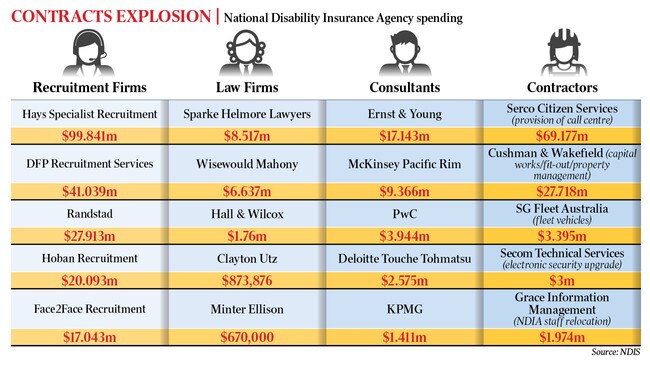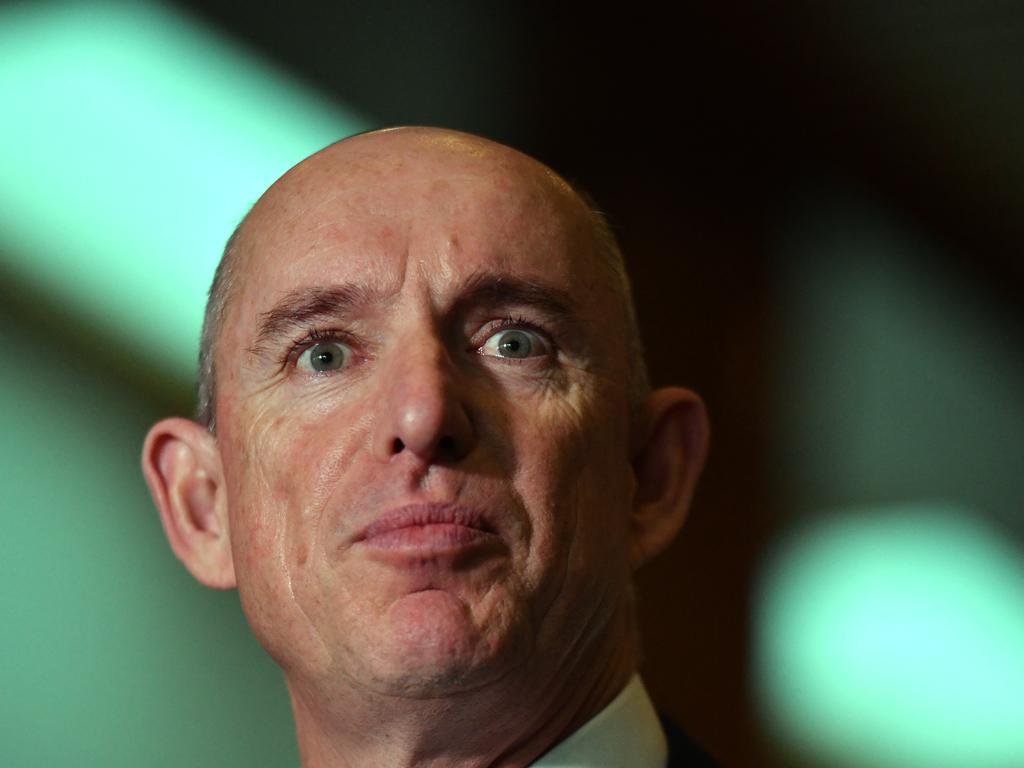Costs balloon in surge of NDIS services
The NDIA has overseen a three-fold spending increase on contractors, recruiters and lawyers as it copes with a flood of new participants.
The National Disability Insurance Agency has overseen a three-fold spending increase on external contractors, recruiters and lawyers as it copes with a flood of new participants in the $22bn disability scheme.
To combat a “dramatic surge” in the number of National Disability Insurance Scheme participants — increasing from 30,281 to 298,816 in three years — the NDIA has been forced to rely on employment agencies for temporary and contract staff. Analysis of individual contracts worth more than $100,000 reveals the ballooning cost burden for taxpayers, with the NDIA engaging private companies to provide staff, call centres, legal, media and writing skills advice, training and security.
Spending for temporary staffing and recruitment support dramatically rose in the past financial year, constituting 49 per cent of the total spending on major contracts, with costs increasing for call centres and legal services.
NDIS spending data reveals 18 law firms and other legal consultants were engaged at a cost of almost $30m to support the NDIA in its response to three royal commissions and the introduction of an Administrative Appeals Tribunal NDIS Division.
An AAT spokeswoman said the division was introduced prior to the national rollout of the NDIS in July 2016.
To avoid further clogging the AAT with NDIS-related cases, support has been provided to facilitate an early resolution model, encouraging participants and legal representatives to resolve matters earlier in the process.
A list of individual contracts worth more than $100,000 shows Hays Specialist Recruitment was engaged to provide staff support at a total cost of almost $100m.
Between July 1 last year and June 30 this year, the number of new participants entering the NDIS totalled 117,307.
According to the NDIA, growth in spending has risen from $1.1bn in 2015-16 to $11.9bn in 2018-19, but operating costs as a percentage of the total cost of the scheme fell from 14.2 per cent in 2017-18 to a projected 8.2 per cent in 2019-20.
The Australian understands this saving has been achieved by reducing the use of consultants and transitioning roles from contract work to Australian public service positions.
Consultancy firms Ernst & Young, KPMG, McKinsey Pacific Rim, Deloitte Touche Tohmatsu, PwC and Healthconsult were also engaged by the NDIA, netting contracts exceeding $40m.
A two-year contract with Serco Citizen Services worth almost $70m — for the “provision of call centre” — paid out $12.4m in the last financial year.
The move to an external call centre, currently averaging more than 90,000 calls a month, achieved cost savings of 23 per cent in 2018-19.
An NDIA spokeswoman said spending on contractors and consultants — as a percentage of total scheme costs — was decreasing from 2.6 per cent in 2017-18 to a projected 1.6 per cent in 2019-20.
The Australian understands a majority of major contracts with consultancy firms covering the period between 2016 and 2019 have been finalised and paid for and that a further reduction in contractor costs was likely to occur when the NDIS hits 500,000 expected participants.
“A reform of this scale and nature requires the ability to improve and adapt processes as quickly as possible given the size of the task at hand,” the NDIA spokeswoman said.
“This may involve the use of expert consultancy services.
“Consultancies have been used to work through specific issues including those related to scheme design, such as work on the new participant pathways.”
Opposition NDIS spokesman Bill Shorten said the scheme had been hit “by a perfect storm of bad management”.
“It has been stripped of $4.6bn in a so-called underspend. It has had a staffing cap imposed on it. And it has outsourced some of its most important public functions,” Mr Shorten said.
“The sad reality is there is next to no oversight of the millions being gifted to this government’s mates in the big consultancies — nor how much they’re delivering back for the public.
“This does the added damage of hollowing out our nation’s public service, stripping it of its know-how, memory and expertise.”
The NDIA said the procurement of all contracts was made according to the Commonwealth Procurement Rules issued by the Department of Finance.
Mr Shorten also expressed concern that the NDIA had passed 150 days without a government-appointed chief executive.
The post has sat unfilled following the departure of former Bankwest managing director Rob De Luca in April, weeks before the May 18 election.

The NDIA chief executive role, which has been advertised, is currently being filled by Vicki Rundle as the government continues its search for a new CEO.
A Department of Social Services report released in March, titled Growing the NDIS Market and Workforce Strategy, forecast an additional 90,000 full-time equivalent employees would be needed over the next five years.
“The scale at which the workforce needs to grow in a short period is significant. It is estimated that the NDIS workforce will need to increase by up to 90,000 full-time equivalent (FTE) employees over the next five years,” the report said.
“This is a challenge for both governments and the sector. Current constraints on workforce growth include low public awareness of NDIS job opportunities, misperceptions about working in the sector, and competition from similar sectors.
“There is also the major challenge of simultaneously growing a diverse and inclusive workforce that reflects the needs of all NDIS participants.”





To join the conversation, please log in. Don't have an account? Register
Join the conversation, you are commenting as Logout